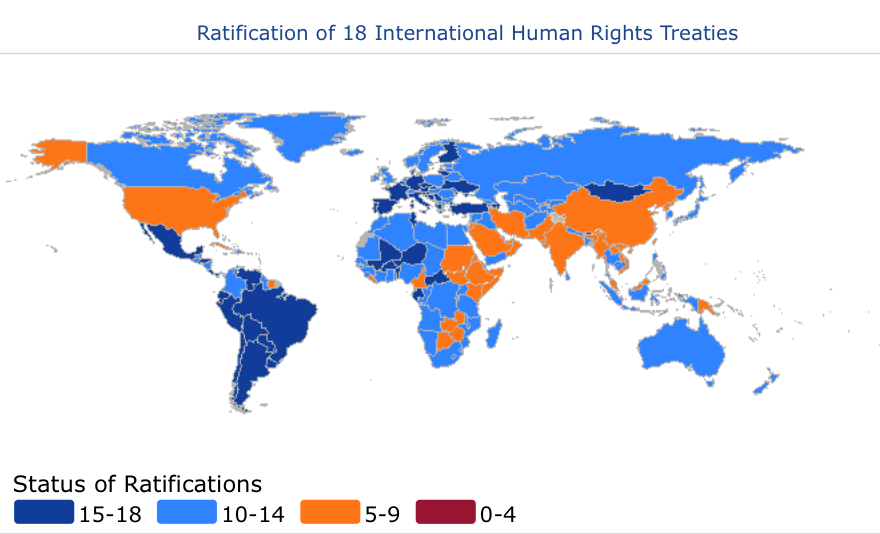SI UN Representative, Berthe De Vos-Neven, provides an insiders look at the history and function of the Committee on the Elimination of All Forms of Discrimination Against Women (CEDAW).
“CEDAW is a United Nations body which consists of 23 independent experts. These experts monitor the implementation of the Convention of December 18th, 1979, which entered in force as an international treaty in 1981. Today, 189 countries have ratified the Convention and they are obliged to submit regular reports to the Committee on how the rights of the Convention are implemented (violence against women, gender pay gap, stereotypes, girl school drop-out rates, inter alia).
During its’ sessions, CEDAW considers each State report and addresses its concerns and recommendations to the Member States in the form of binding observations. Civil society, including NGO’s, are welcome to take part in the sessions, and to formulate requests. Civil Society’s findings are crucial, and are part of the end report of the CEDAW Session. At the end of each day, CEDAW finalises its’ recommendations to improve the implementation of the articles of the Convention by the discussed Member State.

Status of Ratification Interactive Dashboard. Image courtesy of OHCHR. Click the image to view webpage.
In February, I attended the 75th session of the CEDAW in Genève of the review of the following 8 Member States: Afghanistan, Latvia, Pakistan, Zimbabwe, Eritrea, Bulgaria, Republic of Moldova and Kiribati. The first day of the 75th session was marked by a formal opening of the session and a welcoming of the different Member State delegations as well as the NGO’s. In the afternoon, all NGO’s were able to take the floor to share their point of view on the different subjects of the report.
During the next 8 days, each of the 8 Member States were questioned by the experts on their lack of the implementation of the CEDAW convention, the absence of any ratification of the Istanbul Convention, their shortcomings, as well as their improvements (e.g. quote: “…Bulgaria is one of the most successful countries in Europe in terms of digital transformation…”). The State delegations had the opportunity to share their progress in the oral session. The specialists of the Member State’s validated the reports through a series of questions and answers. Afterward, the experts had the opportunity to ask questions on a deeper basis. Although Civil Society and NGO’s are not allowed to take the floor during the review session, their comments were processed in the questions of the experts from CEDAW.
During the session of Bulgaria, and for the first time, an Ombudsman, Mrs. Kovatcheva, was allowed to make a statement, highlighting the violence against women and the absence of rights of Roma women in her home country. Her input was very much appreciated by the Committee.
Conclusion:
After talking with some of the experts from CEDAW, and observing the 75th session, I believe that Soroptimists need to be more involved in the process of CEDAW. We can make a difference by informing CEDAW of projects from our local clubs and improving the quality of facts concerning all forms of discriminations against women. CEDAW recognises the importance of the knowledge from local grassroots. This much needed information helps the expert to evaluate the reports of the Member States during the periodic reports stage.
I am looking forward to the next review in May 2020”.


I totally agree with Berthe. As Soroptimists we see what is and isn’t happening locally and can put that information together to have impact.
I totally agree as well, with Berthe. SI is a “Global Voice for Women” so we should work on how to get this information from local to global (UN). The return is as important, to let the local women know what their states have signed.
An exemple from the Istanbul convention: “The state must promote equality between women and men and prevent violence against women by encouraging mutual respect or non-violent conflict resolution and questioning gender stereotypes – including through teaching materials in schools.”
(https://ec.europa.eu/justice/saynostopvaw/downloads/materials/pdf/istanbul-convention-leaflet-online.pdf)
Goedendag beste mensen,
Graag laat u weten dat ik een mensenrechten activiste ben die opstaat voor alle mensen met een beperking, alle mensen met een diversiteit, alle zieke mensen alle arme mensen en dus ook voor alle vrouwen en meisjes met een beperking. Voor deze bevolkingsgroepen zal ik het VN – Verdrag Handicap vertegenwoordigen, verbinden, behartigen en vooral versterken, dit VN – Verdrag is in 2006 door Nederlandse Regering goed gekeurd en als wet vastgelegd, maar vooralsnog word deze VN-Verdrag Handicap niet mee genomen in de politieke wereld zoals de politieke partijen en de rijksoverheid zoals Ministerie van Binnenlandse Zaken ook niet eens serieus genomen. Ik sta als vrouwelijke VN – Ambassadeur met een beperking en diversiteit op om dit onder de aandacht te brengen. Is het mogelijk om dichter bij de VN te komen? Om mijn Inclusion Voice te laten horen? Want wij als vrouwen en meisjes zij het helemaal zat om elke dag ons lot te moeten ondergaan zowel in het prive – en het werkleven, discriminatie en onderscheid.